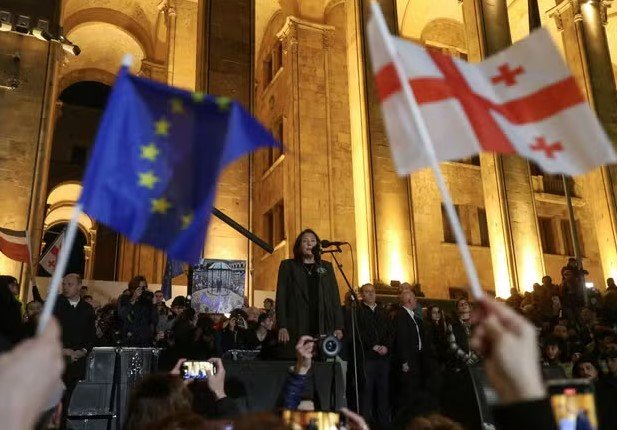European Union leaders have sharply criticized Georgia’s recent local elections, pointing to widespread suppression of dissent that undermined the democratic process. In a joint statement on October 5, 2025, EU High Representative Kaja Kallas and Commissioner Marta Kos highlighted raids on media, arrests of activists, and biased election laws as key issues that led to a boycott by major opposition groups and low voter turnout in the country.
Background on the Elections
Georgia held its municipal elections on October 4, 2025, to choose over 2,000 council members and 64 mayors across the nation. These votes came amid growing political tension, with the ruling Georgian Dream party facing accusations of tightening control over the electoral system.
The elections followed months of controversy, including changes to the election code that favored the incumbents. Opposition leaders claimed these moves made fair competition impossible, prompting several parties to pull out entirely.
Protests erupted in Tbilisi during the voting, organized by figures like opera singer Paata Burchuladze. Demonstrators rallied against what they saw as an illegitimate process, drawing support from eight opposition blocs.

EU’s Key Concerns
The EU statement described the elections as occurring in an environment of extensive crackdown on dissent. Kallas and Kos noted that independent media outlets faced repeated raids, which silenced critical voices ahead of the polls.
They also pointed to new laws aimed at civil society groups, labeling them as tools to stifle opposition. These measures, combined with the jailing of political opponents, created a repressive atmosphere that discouraged participation.
Voter turnout was notably low, with estimates suggesting it fell below 50 percent in many areas, a sharp drop from previous elections. This reflected widespread disillusionment among the public.
The refusal to invite international observers from groups like the OSCE in a timely manner further eroded trust. Local watchdogs also stepped back, citing safety concerns in the hostile climate.
Impact of Opposition Boycott
A significant portion of Georgia’s opposition chose to boycott the elections, arguing that participation would only legitimize a flawed system. This decision left the ruling party with little challenge in many districts.
The boycott was backed by prominent figures and parties, who instead focused on street protests to voice their grievances. In Tbilisi, crowds gathered near government buildings, demanding reforms and the release of detained activists.
Here are some key opposition groups that joined the boycott:
- United National Movement
- European Georgia
- Girchi More Freedom
- Strategy Aghmashenebeli
- Lelo for Georgia
These parties have a history of pushing for closer ties with the West, contrasting with Georgian Dream’s more Russia-leaning stance.
The move highlighted deeper divisions in Georgian politics, where EU membership aspirations have clashed with domestic policies seen as authoritarian.
Police responded to protests with force, leading to injuries among officers and demonstrators. Authorities opened criminal cases related to the unrest, raising fears of further arrests.
Broader Implications for Georgia-EU Relations
The EU’s criticism adds to mounting pressure on Georgia, which has seen its path to EU membership stalled. Protests earlier in 2025 against a foreign agents law drew global attention, with thousands taking to the streets in Tbilisi.
That law, often compared to Russian legislation, requires organizations with foreign funding to register as agents, a move critics say targets pro-democracy groups. The EU has repeatedly called for its repeal as a condition for advancing accession talks.
Georgia’s government has rejected the accusations, claiming the measures protect national sovereignty. However, disinformation campaigns against EU officials, including personal attacks on the EU ambassador, have strained relations.
Looking ahead, the post-election period could see more unrest. The EU urged all sides to avoid violence and engage in dialogue, emphasizing the need for inclusive reforms.
| Aspect | Details | Impact |
|---|---|---|
| Voter Turnout | Below 50% in key areas | Reduced legitimacy of results |
| Opposition Boycott | Involved 8 major parties | Limited competition, potential for disputed outcomes |
| International Observers | Not invited timely | Undermined transparency and global credibility |
| Protests | Widespread in Tbilisi | Led to injuries and criminal probes |
| EU Response | Calls for dialogue and releases | Puts pressure on Georgia’s EU aspirations |
This table summarizes the main elements shaping the elections and their fallout.
Calls for Reform and Future Outlook
Analysts warn that without addressing these issues, Georgia risks further isolation from the West. Recent events echo past crises, like the 2024 parliamentary elections, which also faced rigging allegations and sparked demonstrations.
Public sentiment, as seen in ongoing protests, shows a strong desire for democratic change. Civil society remains active, pushing for the release of political prisoners and fairer laws.
The EU has pledged continued support for Georgia’s democratic forces, but insists on concrete steps from the government. As tensions simmer, the coming weeks will test the nation’s stability.
Share your thoughts on Georgia’s political future in the comments below, and spread this article to keep the conversation going.
